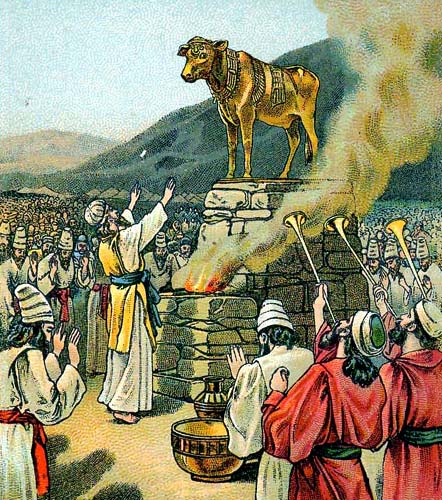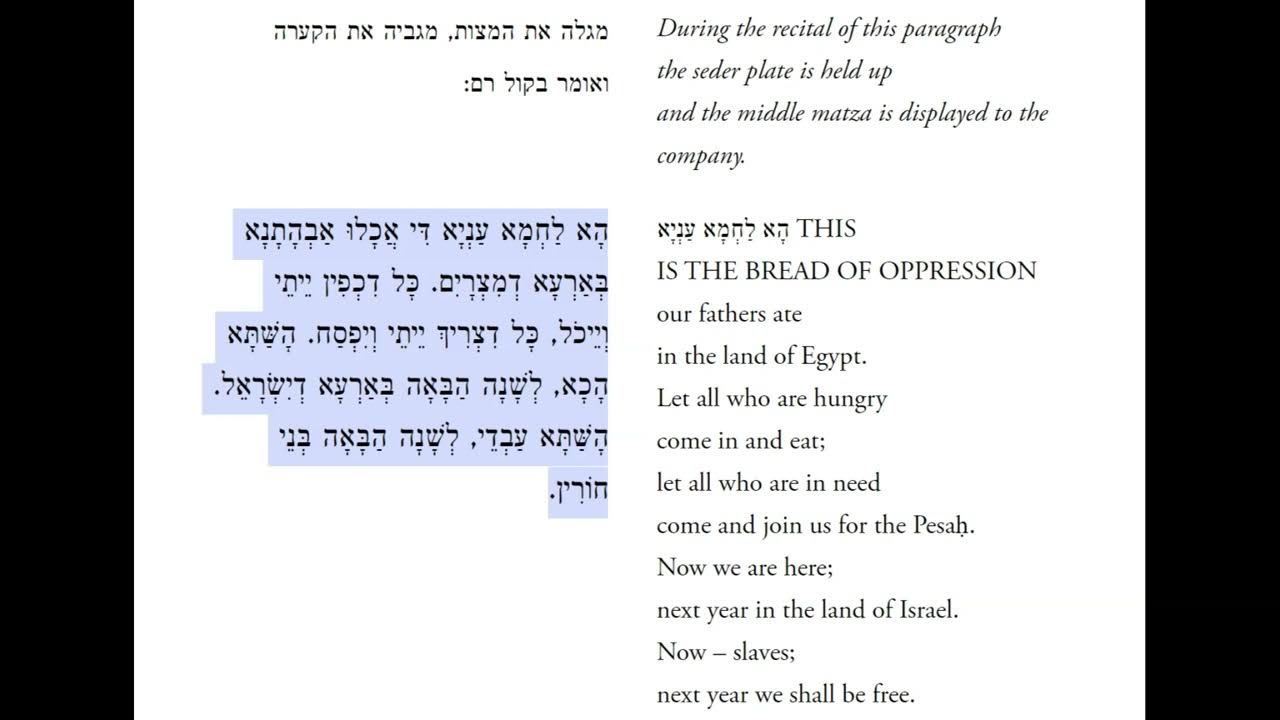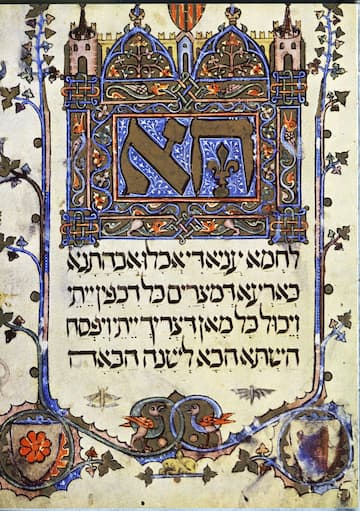
Moshe Wants to Know God
Shortly after the momentous occasion of the Giving of the Law on Har Sinai, the Israelites commit a preposterous transgression. They make and worship a molten idol, the Golden Calf. Moshe pleads with God to show mercy to the rebellious nation, and then makes a request which seems to be out of place (Ex. 33:13):
הודיעני נא את דרכיך ואדעך
Show me Your ways so I may know You!
Moshe continues to explain why he believes that he deserves that knowledge:
ואתה אמרת ידעתיך בשם וגם מצאת חן בעיני
You said that You have known me by name and that I have found grace in Your eyes.
To know by name and to find favor in one’s eyes is to have a personal relationship. Moshe argues that since he has this special relationship with God, he should get to know God better. God’s response to that request was a mystical, breathtaking event, in which Moshe was hiding in the crevice of the rock while God passed His glory before him, proclaiming:
יי יי אל רחום וחנון ארך אפים ורב חסד ואמת, נוצר חסד לאלפים, נושא עון ופשע וחטאה
ונקה לא ינקה. פוקד עון אבות על בנים ועל בני בנים, על שלשים ועל רבעים
YHWH, YHWH, a God compassionate and gracious; slow to anger, abounding in kindness and faithfulness, extending kindness to thousands, forgiving iniquity, transgression, and sin.
Yet I do not remit all punishment, but visit the iniquity of parents upon children, and children’s children, upon the third and fourth generation.

Is God Merciful or Vengeful?
This proclamation seems contradictory, as it describes God as both merciful and vengeful. The Midrash explains that Moshe’s request was to understand the duality of God’s ways in dealing with His world and His creatures. Moshe wanted to understand Divine justice, he wanted to know why the righteous suffer while the wicked flourish.
This is a valid question, and probably the most pressing one for a believer, but it does not belong here, in the aftermath of the Golden Calf. God was about to punish the sinners and reward Moshe, according to a logical system of reward and punishment. There was nothing out of the ordinary to justify such a request.
To Love is to Know
I believe that the answer hides in plain sight. Moshe wanted to get to know God better to have a better relationship. We can paraphrase his words to say: if you truly love me, tell me more about yourself. These are words spoken between spouses and friends. They want proof for the love and for the stability of the relationship. They understand that intimate knowledge will strengthen and deepen the relationship.
The other biblical source which most resembles Moshe’s request is between, Delilah and Shimshon, a wife and husband, although there it is an act of treachery and deceit (Judges 16:15):
ותאמר אליו, איך תאמר אהבתיך ולבך אין אתי? זה שלוש פעמים התלת בי ולא הגדת לי במה כחך גדול.
She said to him: How can you say you love me, when your heart is not with me? You have misled me three times and [still] did not tell me what makes you so strong.
Moshe’s demand for an intimate relationship is not just for himself. Moshe and Israel are one, and despite their iniquities, he feels bound to them by his responsibility and love. He wants to deliver on the promise he conveyed to the people in Egypt, that the Israelites will serve God on Har Sinai. He wants that service to be more than abstract faith and technical rituals. He wants it to be an intimate relationship.
Keeping the Flame Alive (Parashat Ki Tisa)
Moshe wants to know how we can constantly infuse our life with religious and spiritual excitement. He deliberately uses the verb ידע, to know, which in Biblical Hebrew connotes deep intimacy. A marriage can go stale when spouses are no more lovers but merely two people who happen to share assets, memories, and offspring. Spiritual life can be similarly eroded when excitement and inspiration are taken over by routine.
A child growing up in an observant household, people who return to their Jewish roots, or Jews by choice, are excited with every new aspect of religious life. Shabbat is amazing, prayers are inspiring, and shaking the lulav is elevating. The moment when that child, returning Jew, or a Jew-by-choice, is accepted as a full-fledged member of the adult congregation, is a beautiful and memorable moment. However, a time might come when they know exactly what to do, when to do it, how to fulfill their responsibilities towards God, and what to expect in return. Because of that, many people find themselves in a midlife religious crisis. They are going through the motions to the letter of the law, but they have no spark, excitement, or sense of anticipation.
Moshe’s request to know God better is an argument in his people’s favor. He claims that they have sinned because they only know the rigid law and God’s service. If they would know God with the love and passion of spouses or dear friends, the Golden Calf would not have happened.
This interpretation is supported by numerous biblical references which describe our relationship with God in terms of marital life[1]. That analogy inspired the mystics of Safed to create a special matrimonial ceremony on Friday nights, which has been accepted by all Jews. They would face the serene mountains of the Galilee at sunset and welcome the Shabbat, in the way a groom welcomes the bride:
לכה דודי לקראת כלה, פני שבת נקבלה
Come my beloved towards the bride, let us welcome the Shabbat.
Spiritual Intimacy
God’s response to Moshe’s request is a key to having a better spiritual and marital life. The contradiction mentioned above teaches us that part of the relationship is responsibility and caretaking. Visiting the iniquities upon third and fourth generations means that although one can be forgiving, there must be a limit when destructive behavior is evident. When one parent fails to take care of the children and puts them in danger, the other parent cannot stand idly by. When spouses do not treat each other with love and respect, their direct descendants will bear terrible consequences.
Love and kindness infuse the relationship with a sense of commitment and gratitude. In the spiritual realm, the laws between us and others are less prone to become routine actions, and they always give us new insights and excitement.
The elation from giving another person is more than charity and it is not only monetary. It is giving and sharing time, attention, advice, and compassion. It is extended, as the verse says, to thousands. Every person we meet and interact with can teach us something new about the world and about ourselves. When that interaction is one of loving kindness it enables us to see and connect with the humanity in the other, and it is then an uplifting and inspirational experience.
There is Always a Mystery
Before God reveals some secrets to Moshe, He tells him (Ex. 33:20-23):
לא תוכל לראות את פני כי לא יראני האדם וחי… וראית את אחורי ופני לא יראו
You will not be able to see My face, for man cannot see Me while alive… you will see My back but My face will not be seen.
In the quest for God, and in the quest for love, there should always be an unknown. When spouses or friends seek and find new facets of their beloved, they are filled with a sense of mystery and longing, which breed love and passion.
Our quest for God is in essence a search for a meaning and a definition of oneself. We should strive to constantly uncover new secrets and explore new mysteries, and to grow intellectually and emotionally. These secrets are in the wisdom of the Torah, science, and the natural world, but most importantly, they are in each and every one of us.
Moshe, hiding in the crevice, waiting to see God’s face, is an allegory to any human who seeks God. We are both the prophet and the image of God. Sometimes, we hide, we feel lost, and we cower in the dark. We often pursue a dream or a vision which is tantalizingly close but always a step ahead, and we can glimpse its rear.
We believe in the vision and do not give up. Wanting to see its face, we came out of the cave. We thus live a wholesome, compassionate life. We emulate God’s attributes, showing responsibility and honesty, and treating others with love and compassion. When we finally reach the elusive image, and when it turns to look at us, we know: I have found God, I have found myself!
[1] See for example Song of Songs, Isaiah 49:14-21; 50:1; 54:1-8, Jeremiah 2:1-2; 3:1-5.
Questions for Kids (Parashat Ki Tisa)
This Parasha starts with more details of the Mishkan but takes a quick turn into the making of the Golden Calf, which led to the breaking of the לוחות הברית by משה. Later on, בני ישראל do teshuva, ה’ forgives them and gives them the second לוחות הברית.
- Whom did ה’ tell משה to count? How were they counted?
- Which vessel was in the courtyard of the Mishkan? For what purpose?
- Who built the Mishkan and its holy vessels?
- What holy day is a sign between ה’ and בני ישראל?
- What did בני ישראל want when they thought that משה is not coming back?
- What did they ask אהרן to do?
- What did they collect to make this object?
- Who did not contribute to the collection? What was their reward?
- אהרן threw the gold into the fire and it became a __________ . Then בני ישראל offered _____________ and ____________ to it.
- What did משה do when he saw what they did?
- משה prayed to ה’ to forgive בני ישראל, who did Teshuva. ה’ forgave them and gave משה a second set of לוחות הברית. How long was משה on הר סיני when he went to receive this second set?
Answers to Questions for Kids (Parashat Ki Tisa)
- בני ישראל. With a half-shekel coin.
- A copper basin or sink. The kohanim used it to wash their hands and feet.
- Betzalel ben Uri and his helpers.
- Shabbat.
- They wanted someone to lead them.
- Make an object that will be their leader.
- Gold.
- The women. They received Rosh Chodesh.
- אהרן threw the gold into the fire and it became a golden calf. Then בני ישראל offered sacrifices and prayed to it.
- He broke the לוחות הברית.
- Forty days and forty nights.









Parashat Aharei Mot Weekday reading Moroccan te’amim